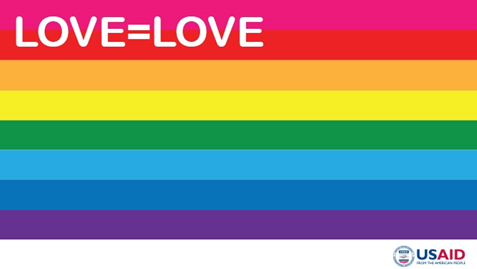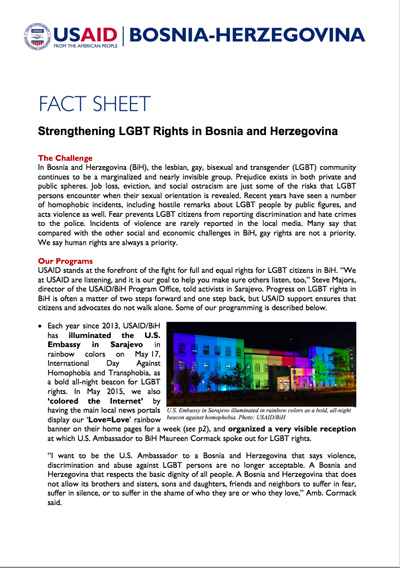
The Challenge
In Bosnia and Herzegovina (BiH), the lesbian, gay, bisexual, transgender and intersex (LGBTI) community continues to be a marginalized and nearly invisible group. Prejudice exists in both private and public spheres. Job loss, eviction, and social ostracism are just some of the risks that LGBTI persons encounter when their sexual orientation is revealed. Recent years have seen a number of homophobic incidents, including hostile remarks about LGBTI people by public figures, and acts violence as well. Fear prevents LGBTI citizens from reporting discrimination and hate crimes to the police. Incidents of violence are rarely reported in the local media. Many say that compared with the other social and economic challenges in BiH, gay rights are not a priority. We say human rights are always a priority.
Our Programs
USAID stands at the forefront of the fight for full and equal rights for LGBTI citizens in BiH. “We at USAID are listening, and it is our goal to help you make sure others listen, too,” the USAID/BiH Program Office Director told activists in Sarajevo. Progress on LGBTI rights in BiH is often a matter of two steps forward and one step back, but USAID support ensures that citizens and advocates do not walk alone. Some of our programming is described below.
- For three years starting in 2013, USAID/BiH illuminated the U.S. Embassy in Sarajevo in rainbow colors on May 17, International Day Against Homophobia and Transphobia, as a bold all-night beacon for LGBTI rights.
- In May 2015, we also ‘colored the Internet’ by having the main local news portals display our ‘Love=Love’ rainbow banner on their home pages for a week, and organized a very visible reception at which the U.S. Ambassador to BiH Maureen Cormack spoke out for LGBTI rights. “I want to be Ambassador to a Bosnia and Herzegovina that says violence, discrimination and abuse against LGBTI persons are no longer acceptable. A Bosnia and Herzegovina that respects the basic dignity of all people. A Bosnia and Herzegovina that does not allow its brothers and sisters, sons and daughters, friends and neighbors to suffer in fear, suffer in silence, or to suffer in the shame of who they are or who they love,” Ambassador Cormack said.
- In 2016, to increase visibility and send a stronger message about LGBTI rights, USAID illuminated the BiH History Museum in rainbow colors. We also arranged for the LGBTI rainbow pennant to be displayed for the first time on the building facades of Embassy Sarajevo and the Banja Luka Branch Office.
- Partnered with USAID’s mission in Kosovo, the BiH mission provided $22,470 to co-finance a regional assessment, “Mapping and Needs Assessment of the LGBT Community in Kosovo and BiH,” to identify groups and NGOs that promote LGBT rights and potential areas for future programming.
- USAID awarded local LGBTI organization Sarajevo Open Center with a $34,200 grant to strengthen LGBTI activism in three cities – Banja Luka, Mostar and Tuzla. Through this activity, we established a regional center in each city to protect LGBTI citizens and teach the public about LGBTI rights (see story). Prior to this, there were no formal LGBTI organizations in any city outside Sarajevo. But these centers are more than safe havens from bigotry and hate. They organize intensive trainings throughout the year to teach local activists how to advance LGBTI rights, particularly how to lobby and advocate in an environment like BiH, where there is a lack of will among politicians for implementing human rights laws and conventions.
- In 2017, USAID provided Sarajevo Open Center with a $35,300 grant to establish an institutional support network for LGBTI people in Sarajevo Canton, and to better inform local representatives and institutions about the rights and challenges of LGBTI persons living in the canton.
- In Republika Srpska, USAID supported the Helsinki Committee for Human Rights to improve existing measures and introduce new measures for ensuring equal rights and treatment for LGBTI persons. The assistance supported and mobilized six local NGOs that promote LGBTI rights.
- As a result of an internship through our media project, Mladen Lukic of Sarajevo decided to tackle media coverage of the challenges facing the LGBTI community in BiH and bring LGBTI rights into public conversation through his reporting. Lukic published a groundbreaking article on LGBTI rights, “LGBT Community in BiH: No Right to Human Rights,” on a local online news portal. The article won him the distinguished “Srdjan Aleksic” award for journalists who report on marginalized groups in BiH (see story).
- In Sarajevo, USAID worked with partner Mediacentar to improve implementation of the Law on Prohibition of Discrimination to better protect the rights of marginalized groups in BiH, including those who are LGBTI. Mediacentar led a USAID-supported coalition of CSOs that evaluated the existing legal framework and implementation of the law, and drafted a position paper outlining 16 major shortcomings and proposals for addressing each of them. The coalition worked closely with the BiH Ministry of Human Rights and Refugees to support the drafting of amendments. The amended law, adopted by the BiH Parliament in July 2016, now explicitly covers sexual orientation and gender identity, and the correct legal terminology is used. The amendments also improve procedures to help the judiciary better implement the law. BiH is the first country in South-East Europe to provide anti-discrimination protection for intersex people in all spheres of life. Assistance also improved the capacities of local LGBTI civil society organizations to raise citizen awareness and become agents of change in the fight against discrimination, especially in legal activism and advocacy.








Comment
Make a general inquiry or suggest an improvement.